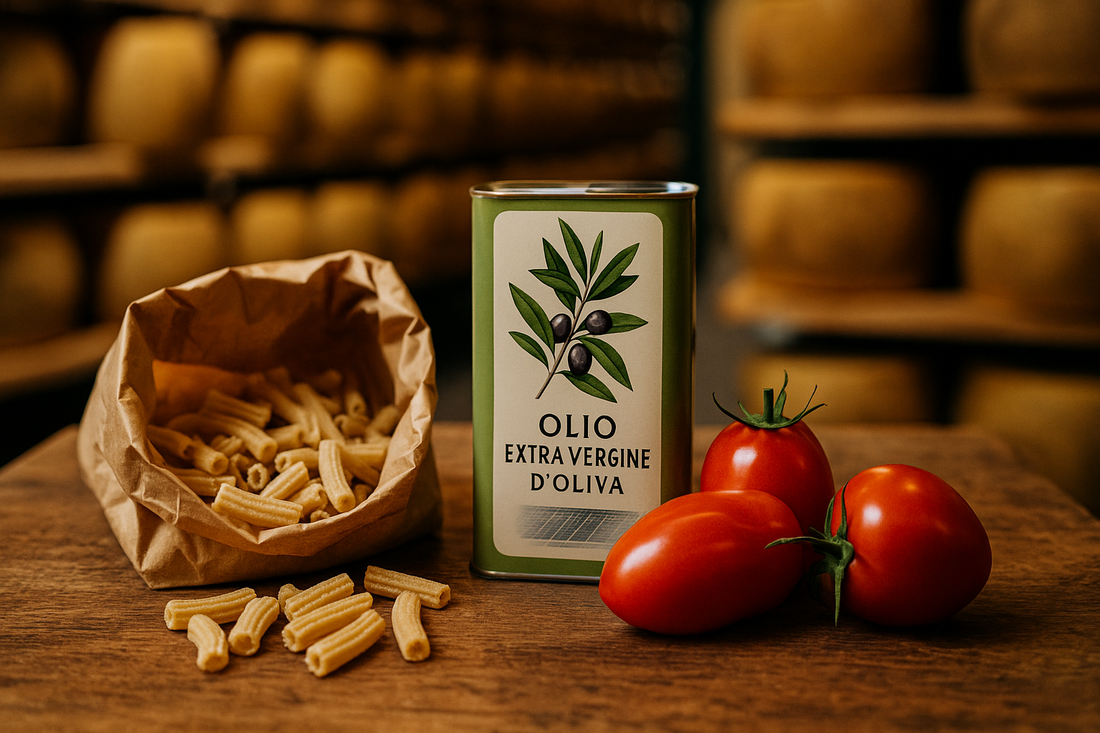
Sustainable food production in Italy: tradition & environment
Sustainability in Italian Food Production – How Traditional Producers Protect the Environment
From solar-powered olive mills in Puglia to zero-waste pasta in Parma, Italy’s family producers prove that artisanal quality and climate action go hand in hand. This guide unpacks organic seals, CO₂ data and best practices—plus tips for eco-smart shopping.
What does sustainable food production mean?
Sustainability rests on three pillars: Ecology (resource & climate protection), Economy (fair pricing & local value) and Social (working conditions & preservation of tradition). Italy excels with its filiera corta—a short supply chain from field to factory—cutting transport CO₂ and keeping produce fresh.
Which organic certifications apply in Italy?
| Label | Key criterion | Highlight |
|---|---|---|
| EU Organic | No synthetic inputs | Recognised EU-wide |
| DOP | Protected origin | Strict region & method |
| IGP | One production stage in region | More flexible than DOP |
| Slow Food Presidium | Biodiversity | Saves rare varieties |
Slow Food Presidia safeguard ingredients such as the Piennolo tomato of Vesuvius and Grani Antichi heritage wheats from Tuscany.
How do Italy’s family producers work sustainably?
1. Local & seasonal raw materials
Durum wheat sourced within 30 km cuts transport emissions by 70 %.
2. Biodiversity & heirloom varieties
Ancient wheat needs fewer pesticides; native olive cultivars thrive in drought.
3. Craft & small batches
Stone-milling and trafilatura al bronzo reduce breakage—less food waste.
4. Renewables & circular loops
Solar panels on olive mills, whey-to-biogas at Parmesan dairies, rainwater recycling in pasta factories.
How climate-friendly are pasta, olive oil, cheese & wine?

Eco-friendly packaging & climate-neutral shipping
Plastic-free alternatives
- Paper pasta bags with bio-barrier layer (Barilla 2024).
- Olive oil in recyclable tins instead of glass → 30 % less CO₂.
How-to: CO₂-neutral delivery
- Bundle items so the parcel ships full.
- Select the GoGreen offset service at checkout.
- Recycle or repurpose the cardboard box.
How does Pareto Shop support sustainable producers?
- 100 % EU-Organic or higher (DOP, IGP).
- Short supply chain—max two intermediaries.
- Plastic-free or recyclable packaging.
- Climate-neutral DHL GoGreen shipping.
Checklist for mindful shopping
- Check the label (EU-Organic, DOP).
- Favour seasonal products.
- Watch the packaging material.
- Opt for climate-neutral delivery.
FAQ – Sustainable Italian foods
- Which Italian organic labels exist?
- EU-Organic, DOP, IGP and Slow Food Presidia.
- Is Italian olive oil truly sustainable?
- Yes—olive trees sequester CO₂ and many mills run on solar power.
- How to cut CO₂ when buying cheese?
- Choose PDO dairies using whey-based biogas—up to 35 % methane cut.
- DOP vs EU-Organic—what’s the difference?
- DOP protects origin & method; EU-Organic bans synthetic inputs.
- How do I spot plastic-free packaging?
- Look for a “Plastic Free” logo or paper bags with bio-based windows.
Wrap-up: Enjoy Italian delicacies sustainably
- Organic & DOP labels guarantee eco-social standards.
- Heirloom crops and renewables slash CO₂.
- Plastic-free packs + GoGreen shipping close the loop.
